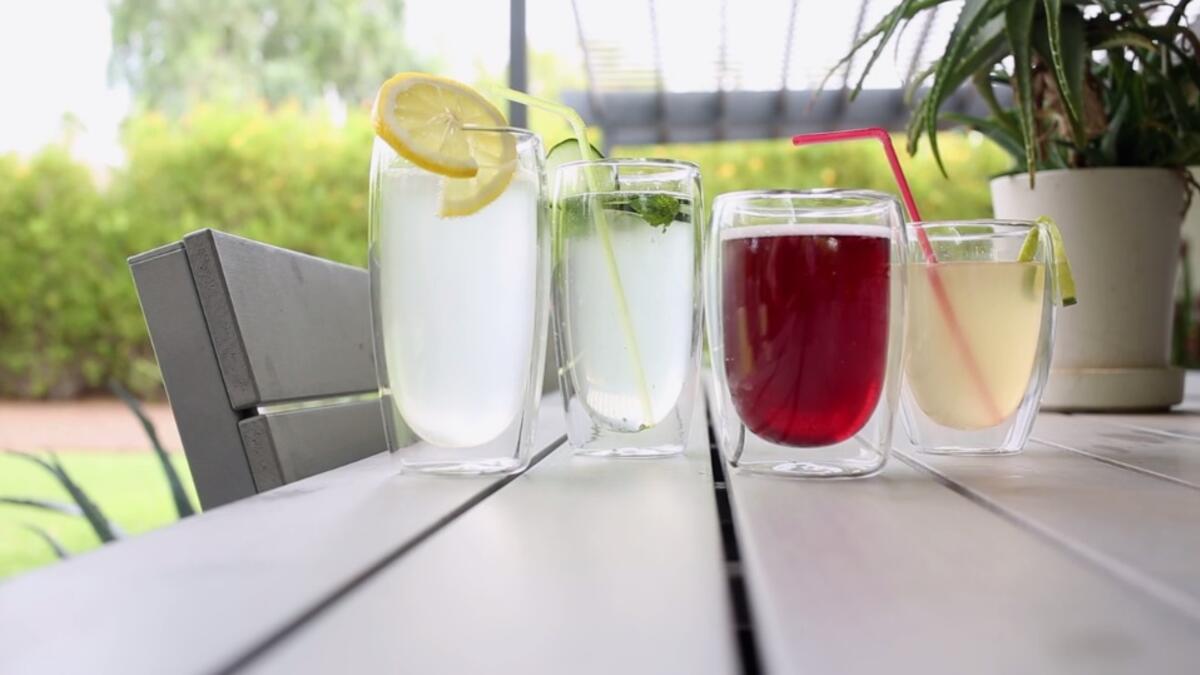Editor's Note: This is the second installment in an ASU Now series featuring nutritious recipes demonstrated by faculty from the School of Nutrition and Health Promotion, an academic unit of ASU’s College of Health Solutions. Find the first installment, about overnight oats, here.
It’s already November, and students at ASU have celebrated the homecoming game, indulged their pumpkin spice cravings and rescued their snuggly hoodies from the deep recesses of their closets. But they probably haven’t donned them just yet — although all signs point to fall, the temperatures in Tempe, Arizona, remain steadfastly north of 80 degrees on average.
High temperatures can be an issue when you’re competing in outdoor sports, as many students who participate in Sun Devil sports clubs do. Loss of electrolytes through sweat can happen more quickly, making it especially important to replenish them.
“When dehydrated, the body can overheat more easily, which can lead to heatstroke,” said Simin Levinson, ASU clinical assistant professor of nutrition.
In addition, dehydration can affect mood, reduce energy levels, cause muscle cramps and headaches, and may even reduce cognitive function.
Levinson, who also works as a consulting nutritionist for the Phoenix Suns, teaches a course at ASU on sports nutrition in which her students engage in a peer-to-peer exchange with students participating in ASU club sports by providing them with nutrition guidelines to ensure they’re maintaining an overall state of good health and performing at peak athletic ability.
The exchange benefits both parties.
“My students benefit by gaining experience in preparing and delivering nutrition presentations and handout materials,” Levinson said, “and the club sport student-athletes benefit from the nutrition information and practical tips.”
One of the best tips is also one of the most obvious: Stay hydrated. It’s also great advice for students who feel themselves succumbing to cold and flu season as electrolytes can be lost through diarrhea and vomiting associated with illness.
And although it may be tempting to reach for a store-bought sports drink, making your own is both better for you and easy to do — even in a dorm-room setting.
“Homemade electrolyte drinks are made with familiar and natural ingredients and are free of artificial colors and artificial flavors,” Levinson said. “They’re a great way to naturally replenish electrolytes.”
A self-described “recreational athlete,” she often makes her own rehydrating electrolyte drinks at home to refuel after a hike. They’re so easy, her teenage daughter started making them for her softball practices.
Here, Levinson shares four rehydrating electrolyte drink recipes you can try out yourself.
Lime Coconut
Ingredients:
1–2 limes, juiced
1 cup water
2 cups coconut water
2 tbsp. maple syrup
¼ tsp. salt
Directions: Combine all ingredients in a pitcher or jar. Stir or shake until well-blended. Pour into a glass and enjoy!
Lemon Ginger
Ingredients:
1 lemon, juiced
3 cups mineral water
1 ginger chunk, grated
2 tsp. agave nectar
¼ tsp. salt
Directions: Combine all ingredients in a pitcher or jar. Stir or shake until well-blended. Pour into a glass and enjoy!
Green Tea and Juice
Ingredients:
2 cups green tea
½ cup pomegranate juice
2 tbsp. honey
¼ tsp. salt
Directions: Combine all ingredients in a pitcher or jar. Stir or shake until well-blended. Pour into a glass and enjoy!
Cucumber Cooler
Ingredients:
2 tbsp. lime juice
2 cups water
2 sprigs mint, muddled
2 tsp. agave nectar
¼ tsp. salt
Cucumber slices to taste
Directions: Combine all ingredients in a pitcher or jar. Stir or shake until well-blended. Pour into a glass and enjoy!
More Health and medicine

College of Health Solutions launches first-of-its-kind diagnostics industry partnership to train the workforce of tomorrow
From 2007 to 2022, cytotechnology certification examinees diminished from 246 to 109 per year. With only 19 programs in the United States, the cytology workforce that stands at the front line of…

ASU's Roybal Center aims to give older adults experiencing cognitive decline more independence
For older people living alone and suffering from cognitive decline, life can be an unsettling and sometimes scary experience.Arizona State University is out to improve that experience.Two projects…

Dynamic data duo advances health research
The latest health research promises futuristic treatments, from cancer vaccines to bioengineered organs for transplants to medical nanobots. While these technologies may one day be…


